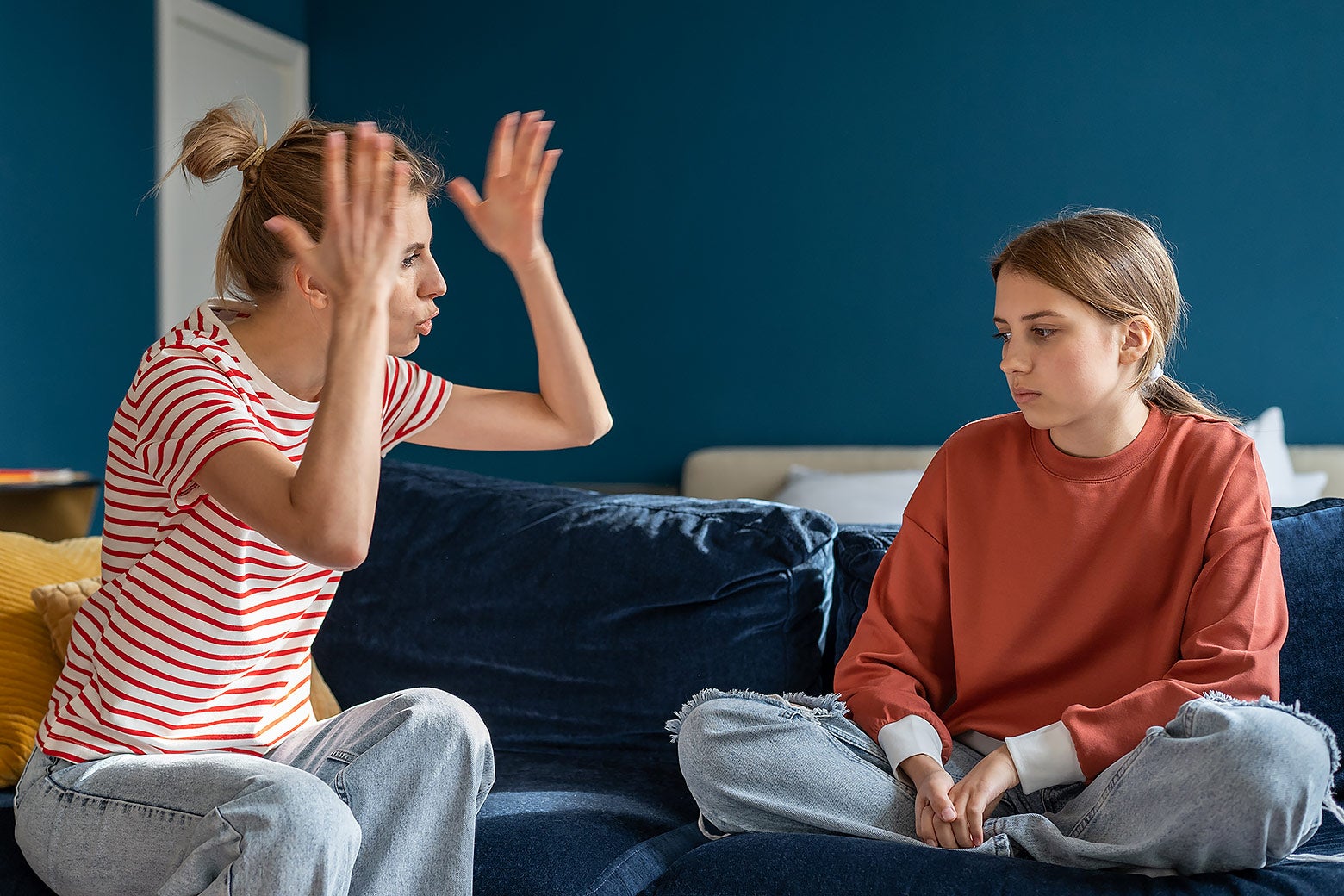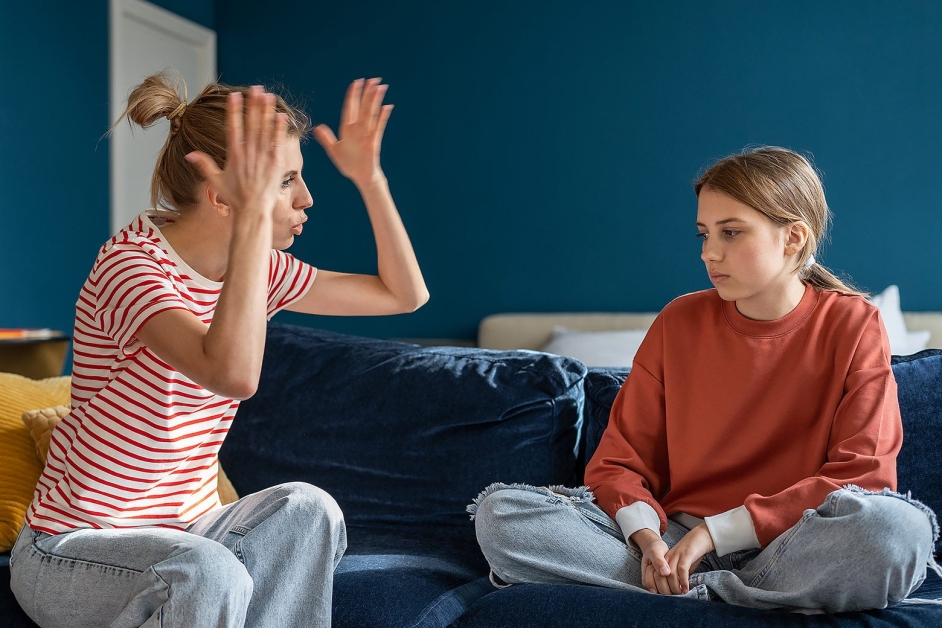How “emotion regulation” became the latest thing in online parenting advice.

We’ve had resilience, we’ve had self-care, we’ve had grit. But if you have spent any time on the internet lately, you might notice that the spotlight now belongs to a different term altogether: emotion regulation.
You have probably seen its virtues extolled everywhere. It’s even been touted by some as a new “form of generational wealth.” Especially if you’re a parent, you’ve likely been told to regulate your emotions before you attend to your child, so that you can respond in a balanced way, instead of flying off the handle and saying things you might regret later. Mothers and fathers are advised to take classes to learn emotion-regulation skills and are given scripts to repeat and strategies to follow, to prevent them from unbalancing and traumatizing their children.
But as parents, we’ve all had moments when we’ve lost it, then blamed ourselves for being dysregulated. I know I have. But humans aren’t machines, to be easily recalibrated. Telling me to regulate myself would probably have an effect contrary to what was intended. As the saying goes, “Never in the history of calming down has anyone calmed down by being told to calm down”—so how is the recommendation to regulate our emotions any different?
Like many other similar ideas, such as “toxic” people, “triggers,” “narcissism,” or “gaslighting,” that have joined the ranks of so-called therapy-speak, emotion regulation has some grounding in science. Research on the topic took off in the 1990s and has grown exponentially since. “It used to be, I’d go to an emotion conference, and it would be one of the topics among many. And now you go there, and it feels like everyone tells you they’re doing emotion regulation,” says Yulia Chentsova Dutton, a cultural psychologist at Georgetown University who studies emotions.
As researchers became more interested in this work, it started to filter out, becoming one of countless psychological terms that have crept into the mainstream, especially as the findings started being applied in therapy, from which they trickled down into the public consciousness through wellness and self-help books, among other things. But, as researchers I interviewed noted, the issue is that the popular idea of “regulation” promotes a rigid and narrow conception of what emotions actually are.
“I take emotion to be changes in how we feel and how our body responds. And there are different flavors of emotional response, and we give them names like anger and fear and sadness and happiness,” says James J. Gross, a psychology professor at Stanford University, where he directs the Stanford Psychophysiology Laboratory. Emotions might not always be pleasant to feel, but they are usually helpful to us.
However, it is in the instances when they have the power to make us act foolishly, or when we’re experiencing the wrong kind of emotion, that we must examine the resources we have at hand to alter the way we feel. And according to researchers, that’s exactly what emotion regulation is.
“Emotion regulation is an effort to change your emotion in some way, either to upregulate, to increase its intensity, or downregulate,” says Chentsova Dutton. This definition is particularly interesting because, contrary to how the term is generally understood, regulation does not always necessarily mean “an attempt to stay calm.”
Often, we use emotion-regulation strategies to turn down a negative emotion, but that’s not always the case. “It depends on your emotional goals. Someone may have a goal of feeling sad or feeling alert and on guard in a particular situation, and so they may regulate towards that state,” Chentsova Dutton says. Athletes, for example, might want to make themselves a bit angry before a game, so that they can feel energetic and ready when it matters.
The primary aim of emotion regulation is to alter the way someone is feeling, and that can happen on several levels. First, Gross says, “there’s a situation, and you pay attention to it. You can evaluate or appraise it. And then there’s a bodily response.” Emotion regulation can happen at every level. For example, you can either leave or modify a situation. You can tweak what you’re paying attention to. You can change your thinking, or you can change your response.
And even though social media would have you believe that all emotion regulation is beneficial, this isn’t always the case. For example, when people these researchers studied tried suppressing the emotions they considered “bad” (a popular emotion-regulation strategy), that didn’t do much to improve their moods. “We found again and again that there are some pretty expensive things about expressive suppression. It takes a lot of your cognitive resources, so you’re kind of stupider,” Gross says. Ruminating, or being stuck in a cycle of negative thoughts, is another harmful emotion-regulation strategy that only adds to people’s distress instead of helping them cope.
But even helpful ways to regulate emotions can often backfire. For example, reappraisal, a technique focused on helping people change their emotions by altering their thoughts, didn’t always turn out to be the best response in situations that require quick reflexes, such as the case of firefighters running into a burning building.
Most of all, though, as Chentsova Dutton points out, “we’re not living in individual bubbles. We’re living in a culture.” The way people express feelings and which emotions are considered functional differ across the world, as does the extent to which people feel they have control over their emotions. Chentsova Dutton herself did research on Eastern European subjects who commonly expressed the sentiment, when asked about the idea of regulating emotion, “Why would you try to regulate the weather?”
When people harbored those beliefs, they didn’t even try to regulate their emotions, because they felt it wasn’t worth it. But on the flip side—and this was particularly the case in more individualistic societies, such as the U.S.—people felt as if they had to be perfectly in control of their emotions at all times.
“There’s a big caution on that, because you don’t have perfect control over your emotions, or at least most people don’t, even people who are extensively trained,” Gross says. This is a phenomenon known as emotional perfectionism, and it might make us feel like we’re never good enough, even when it comes to such natural things as feelings.
There are also individual differences in our ability to regulate our emotions, with some people struggling more than others. “Think about a car with a gas pedal and a brake pedal. Some people just have a car with the gas pedal that’s kind of pressed down, so they have lots and lots of negative emotion,” explains Gross. If emotions are like the weather, some people are just naturally stormier than others.
Emotion regulation is a part of executive function, and many neurodivergent people—for example, those with ADHD—struggle with it. Racism is another reason why emotion regulation can be more challenging for some people, who may experience more difficult situations than others. “The negative is just so large and intractable that trying to put a positive spin on it backfires,” Chentsova Dutton explains.
This is why blaming individuals for their real or perceived dysregulation is unhelpful at best, and harmful at worst. For example, if someone is depressed or anxious and you try to tell them it’s their fault because they should have regulated better, “that’s not a good message, because they couldn’t have done anything different,” says Gross. There might be a reason why so many parents are stressed out, and it’s not all due to their dysregulation.
The popular ideas about emotion regulation “present the image of a person who is an autonomous master of the emotional realm. And it’s a little bit like emotions are like a muscle. But emotions are nothing like a bicep. Emotions are much more complex,” explains Chentsova Dutton.
The opposite of emotion regulation is being dysregulated, but that term seems to be used online to describe a variety of emotional states, which could include being stressed out, angry, annoyed, or overwhelmed. But putting all of these feelings under the umbrella of dysregulation is doing us a disservice. Some theorize that being able to practice emotion differentiation, or emotional granularity—being able to describe our emotional states in great detail, and naming emotions accurately—is good for our well-being. Calling all negative emotions dysregulation is doing just the opposite.
All of the above being said, for many people, emotion regulation can be an extremely helpful concept. Researchers who study it, such as Gross, consider it an important skill to learn. For example, when parents are trying to keep their child calm in a stressful situation, they are doing the crucial work of preventing their own fear from being passed on to their children. The concept is not nonsense. It’s just that it has been misrepresented and blown completely out of proportion. And it can add to the distress and exhaustion that so many parents feel nowadays, to the point that even the U.S. surgeon general mentioned it in his recent advisory. Parents need tangible support, not more advice or blame.
The important thing is to keep “emotion regulation” balanced out against other strategies you might have to handle the challenges of daily life. Not all strategies should be directly aimed at changing the way we feel; some might instead consider the individual as part of a wider culture. “You could also say, I would rather focus and regulate my body or I would rather focus and regulate the relationships that I have with other people. Or I would rather focus and regulate my behavior,” explains Chentsova Dutton.
“You need to experiment, and you need to have a large repertoire, a lot of tools in your tool bag, so that you can select which ones might be appropriate to the situation that you find yourself in.”
In the meantime, don’t beat yourself up if you can’t handle every situation with your children perfectly. And if someone tells you any different, you can tell them to go regulate themselves.





